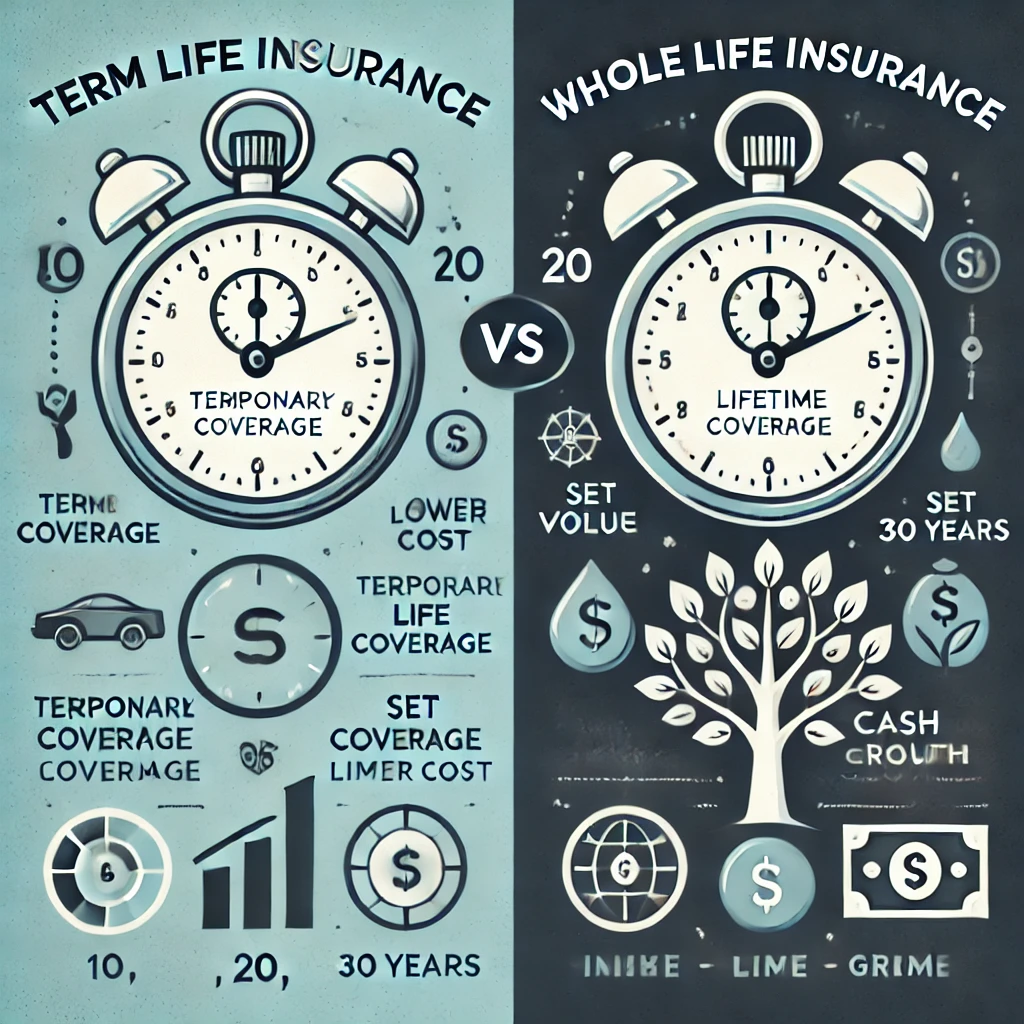Sep 18, 2024
When purchasing life insurance, you are likely to be overwhelmed by two primary categories namely, term life insurance and whole life insurance policies. The aim in both cases is the same; Protect your dependents financially; however, they go about it in entirely different mannerisms. Wherever you are, be it Detroit (48201), Grand Rapids (49503) or Lansing (48933) it is essential to know how each differs so that you make the finest choice for your family. Let us analyze what differentiates each policy from the other.
What is Term Life Insurance?
A term life insurance policy is easy to understand. You select a definite duration such as 10, 20 or 30 and you pay every month. If you die within this period, your dependents get a death benefit which is a one-time payment.
The problem is that coverage will be discontinued when the term expires. In order to maintain coverage, you’d typically have to update or convert your policy, which is generally more expensive.
For instance, a 35-year-old individual from Ann Arbor (48103) can choose to get a 20-year term policy to last while young kids are under your care or the mortgage is still not paid off. At the end of the period, there may not be any need for any insurance cover.
The biggest advantage? Term life insurance is often much cheaper than whole life insurance.
Why Choose Term Life Insurance?
Lower Cost: In general, premiums for this type of policy are quite lower than other whole life insurance policies.
Simple: It’s straightforward and easy to use.
Flexible: You can select the time limits that match your fiscal obligations.
What is Whole Life Insurance?
On the other hand, whole life insurance is fun as it is less complicated but offers coverage for a lifetime. The policy remains enforceable provided that the premiums are maintained. Furthermore, a part of the premiums is allocated to a cash value account which appreciates with time.
Unlike a term life insurance policy, whole life insurance has no expiration limits. It also has a savings aspect that enables you to tap into the cash value if necessary. This can be a huge benefit if you get into a situation where you need fast cash.
For example, if you stay in Michigan with the zip code of Flint (48502), with a whole life policy, you don’t just have life-long coverage, you can also utilize the cash value to cover other big expenses in the future, say education or retirement.
Why Choose Whole Life Insurance?
- Lifetime Coverage: As long as you pay your premiums, you’re covered for life.
- Cash Value Growth: A portion of your premium builds cash value over time, which can be borrowed against.
- Peace of Mind: You don’t have to worry about losing coverage as you age.
The Key Differences
Coverage Period: Term life insurance lasts for a set number of years, while whole life covers you for your entire life.
Cost: Term life is cheaper, but you get what you pay for—once the term ends, you have no coverage. Whole life is more expensive but provides lifelong coverage and grows cash value over time.
Cash Value: Whole life insurance has a cash value component, term life does not.

Which Should You Choose?
It totally depends on your situation and preference. For those residing in areas like Troy (48083) or Kalamazoo (49007), and if your concern is mainly for your loved one while repaying the mortgage or raising children, then term life insurance is possibly the better policy to have. The price is reasonable and the cover comes when it is most needed.
On the other hand, if you’re looking for a long-term financial tool that provides both protection and cash value, whole life insurance might be the way to go. If you’re in areas like Sterling Heights (48310) or Warren (48088) and want lifelong coverage with a savings element, then the extra cost of whole life could be worth it.
Example Scenarios
For Term Insurance: Imagining about Term insurance policy; you are 40 years old with two small dependent kids and a mortgage living in Livonia (48150). You choose the policy with a term of 20 years in order to obtain coverage for the children’s education until the mortgage is completely paid. This ensures that if an untoward incident strikes someone during this level of time, the family is provided with monetary assistance. When children will grow up and the property will be paid out, the necessity in insurance will probably vanish.
For Whole Life: You are a 30 year old Southfield (48033) resident whose long term financial plans do not include cancelling her policy on life insurance. So, you purchase continual protection for life. Through out the years, you do not only hold insurance, but you also accumulate cash value. By the time you’re hitting fifty or sixty, you can utilize that cash value to take care of your retirement needs or other major purchases.
How to Decide
Here’s a quick checklist to guide your decision:
- Budget: If you want the most affordable option, go with term life.
- Coverage Length: If you only need coverage for a specific time (like until your kids graduate), term life works best.
- Lifelong Protection: If you want coverage for life, whole life is the way to go.
- Building Cash Value: If you want a policy that also works as a savings tool, choose whole life.
Michigan Residents: What to Keep in Mind
Whether you are located in Dearborn (48124), Westland (48185) or Rochester hills (48309) seek to factor in your cost of living and the level of cover you think your family may require. Getting life insurance is a tough decision that may depend on a number of factors. However, some of these factors can be alleviated by having proper guidelines.
At Get Life Insurance, we can help you weigh the pros and cons of both term life insurance and whole life insurance. If you have questions or need a personalized quote, feel free to contact us at (313) 561-2486 or send an email to info@get-life-insurance.com.
The Bottom Line
Choosing between term life and whole life insurance is all about understanding your financial needs and goals. Term life is more affordable, while whole life offers lifetime coverage and savings potential. No matter what city in Michigan you call home—from Detroit (48201) to Traverse City (49684)—we’re here to help you make an informed decision.
Feel free to reach out with any questions! We’re happy to guide you in finding the best life insurance policy for your needs.




